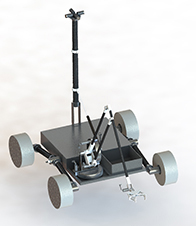
If you think parallel parking a car is difficult, try navigating a robotic vehicle through an obstacle course when you're 900 miles away from the scene. After conquering that, you might be ready for NASA work: helping a rover remotely conduct scientific research on another planet. That's what University of Nebraska-Lincoln College of Engineering students are aiming for, with their participation in a prestigious competition.
UNL was one of eight institutions chosen to compete in the 2013 RASC-AL Exploration Robo-Ops Competition, an engineering challenge sponsored by NASA and organized by the National Institute of Aerospace.
For the Robo-Ops contest, selected teams of undergraduate and graduate students build planetary rover prototypes to perform a series of tasks in the "Rock Yard" at NASA's Johnson Space Center in Houston this June.
At the event, UNL will compete with its "Rover of the Corn" against seven other RASC-AL Robo-Ops 2013 teams: Arizona State University; Florida Agricultural and Mechanical University and Florida State University; University of Maryland; University of Massachusetts-Lowell; University of Utah; Worcester Polytechnic Institute; and West Virginia University and Bluefield State College.
Each team receives a $10,000 award to aid its full participation in Robo-Ops, including expenses for rover development, materials, testing equipment, hardware and software. First prize in the competition is an additional $6,000, but bragging rights might be priceless for Joe Bartels, UNL team leader and a graduate student in the Department of Mechanical and Materials Engineering.
In Houston, the rovers will navigate a planetary simulation environment under the supervision of NASA judges. "Up to three members of the team plus our faculty adviser, Professor Shane Farritor, will travel to JSC for the on-site testing," Bartels said. "The remaining team members will remain at UNL to conduct 'mission control' tasks."
The prototype rovers will be tele-operated by the university teams and must negotiate a series of obstacles while accomplishing a variety of tasks. Sample tasks include handling specified upslopes and downslopes, crossing sand and gravel pits, picking up specific rock samples and carrying them the remainder of the course, and driving over rocks of specified diameter.
According to the RASC-AL Robo-Ops website, http://www.nianet.org/RoboOps-2013/index.aspx, each rover must be controlled from the home university campus via a commercial broadband wireless uplink. The only information available to the rover controller for performing the tasks will be transmitted through an on-board rover video camera or cameras, or other on-board sensors. Cameras will allow transmission of the competition back to UNL and to the general public.
The competing teams must also engage the public in their missions and research, with education and outreach for their rover to build excitement for future NASA missions. Bartels said, "We'd like to 'bring the public along' throughout the whole project and competition."
A list of students on UNL's Robo-Ops team by hometown follows. All are mechanical and materials engineering majors. For more information about UNL's Rover of the Corn and its team, visit http://www.facebook.com/unlrover.
Crete: Lukas Renker, sophomore.
Lincoln: Effie Greene, junior; Mark Reichenbach, senior.
Omaha: Walter Bircher, senior; Tom Frederick, graduate student; Allison Miller, junior.
Randolph: Kearney Lackas, graduate student.
Ravenna: Eric Markvicka, graduate student.
Wauneta: Joe Bartels, graduate student.
York: Alex Adams, graduate student.
-- Carole Wilbeck, College of Engineering
More details at: http://go.unl.edu/jt9